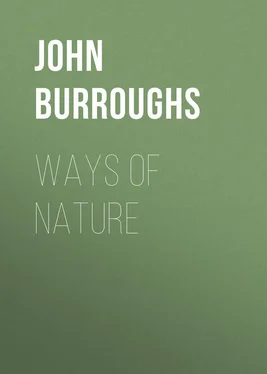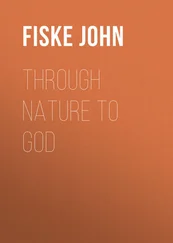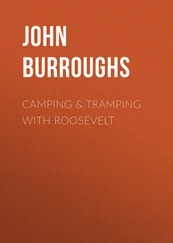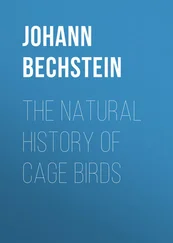John Burroughs - Ways of Nature
Здесь есть возможность читать онлайн «John Burroughs - Ways of Nature» — ознакомительный отрывок электронной книги совершенно бесплатно, а после прочтения отрывка купить полную версию. В некоторых случаях можно слушать аудио, скачать через торрент в формате fb2 и присутствует краткое содержание. Жанр: foreign_antique, foreign_prose, на английском языке. Описание произведения, (предисловие) а так же отзывы посетителей доступны на портале библиотеки ЛибКат.
- Название:Ways of Nature
- Автор:
- Жанр:
- Год:неизвестен
- ISBN:нет данных
- Рейтинг книги:3 / 5. Голосов: 1
-
Избранное:Добавить в избранное
- Отзывы:
-
Ваша оценка:
- 60
- 1
- 2
- 3
- 4
- 5
Ways of Nature: краткое содержание, описание и аннотация
Предлагаем к чтению аннотацию, описание, краткое содержание или предисловие (зависит от того, что написал сам автор книги «Ways of Nature»). Если вы не нашли необходимую информацию о книге — напишите в комментариях, мы постараемся отыскать её.
Ways of Nature — читать онлайн ознакомительный отрывок
Ниже представлен текст книги, разбитый по страницам. Система сохранения места последней прочитанной страницы, позволяет с удобством читать онлайн бесплатно книгу «Ways of Nature», без необходимости каждый раз заново искать на чём Вы остановились. Поставьте закладку, и сможете в любой момент перейти на страницу, на которой закончили чтение.
Интервал:
Закладка:
One season a wood duck laid her eggs in a cavity in the top of a tall yellow birch near the spring that supplies my cabin with water. A bold climber "shinned" up the fifty or sixty feet of rough tree-trunk and looked in upon the eleven eggs. They were beyond the reach of his arm, in a well-like cavity over three feet deep. How would the mother duck get her young up out of that well and down to the ground? We watched, hoping to see her in the act. But we did not. She may have done it at night or very early in the morning. All we know is that when Amasa one morning passed that way, there sat eleven little tufts of black and yellow down in the spring, with the mother duck near by. It was a pretty sight. The feat of getting down from the tree-top cradle had been safely effected, probably by the young clambering up on the inside walls of the cavity and then tumbling out into the air and coming down gently like huge snowflakes. They are mostly down, and why should they not fall without any danger to life or limb? The notion that the mother duck takes the young one by one in her beak and carries them to the creek is doubtless erroneous. Mr. William Brewster once saw the golden-eye, whose habits of nesting are like those of the wood duck, get its young from the nest to the water in this manner: The mother bird alighted in the water under the nest, looked all around to see that the coast was clear, and then gave a peculiar call. Instantly the young shot out of the cavity that held them, as if the tree had taken an emetic, and came softly down to the water beside their mother. Another observer assures me that he once found a newly hatched duckling hung by the neck in the fork of a bush under a tree in which a brood of Wood ducks had been hatched.
The ways of nature, – who can map them, or fathom them, or interpret them, or do much more than read a hint correctly here and there? Of one thing we may be pretty certain, namely, that the ways of wild nature may be studied in our human ways, inasmuch as the latter are an evolution from the former, till we come to the ethical code, to altruism and self-sacrifice. Here we seem to breathe another air, though probably this code differs no more from the animal standards of conduct than our physical atmosphere differs from that of early geologic time.
Our moral code must in some way have been evolved from our rude animal instincts. It came from within; its possibilities were all in nature. If not, where were they?
I have seen disinterested acts among the birds, or what looked like such, as when one bird feeds the young of another species when it hears them crying for food. But that a bird would feed a grown bird of another species, or even of its own, to keep it from starving, I have my doubts. I am quite positive that mice will try to pull one of their fellows out of a trap, but what the motive is, who shall say? Would the same mice share their last crumb with their fellow if he were starving? That, of course, would be a much nearer approach to the human code, and is too much to expect. Bees will clear their fellows of honey, but whether it be to help them, or to save the honey, is a question.
In my youth I saw a parent weasel seize one of its nearly grown young which I had wounded and carry it across an open barway, in spite of my efforts to hinder it. A friend of mine, who is a careful observer, says he once wounded a shrike so that it fell to the ground, but before he got to it, it recovered itself and flew with difficulty toward some near trees, calling to its mate the while; the mate came and seemed to get beneath the wounded bird and buoy it up, so aiding it that it gained the top of a tall tree, where my friend left it. But in neither instance can we call this helpfulness entirely disinterested, or pure altruism.
Emerson said that he was an endless experimenter with no past at his back. This is just what Nature is. She experiments endlessly, seeking new ways, new modes, new forms, and is ever intent upon breaking away from the past. In this way, as Darwin showed, she attains to new species. She is blind, she gropes her way, she trusts to luck; all her successes are chance hits. Whenever I look over my right shoulder, as I sit at my desk writing these sentences, I see a long shoot of a honeysuckle that came in through a crack of my imperfectly closed window last summer. It came in looking, or rather feeling, for something to cling to. It first dropped down upon a pile of books, then reached off till it struck the window-sill of another large window; along this it crept, its regular leaves standing up like so many pairs of green ears, looking very pretty. Coming to the end of the open way there, it turned to the left and reached out into vacancy, till it struck another window-sill running at right angles to the former; along this it traveled nearly half an inch a day, till it came to the end of that road. Then it ventured out into vacant space again, and pointed straight toward me at my desk, ten feet distant. Day by day it kept its seat upon the window-sill, and stretched out farther and farther, almost beckoning me to give it a lift or to bring it support. I could hardly resist its patient daily appeal. Late in October it had bridged about three feet of the distance that separated us, when, one day, the moment came when it could maintain itself outright in the air no longer, and it fell to the floor. "Poor thing," I said, "your faith was blind, but it was real. You knew there was a support somewhere, and you tried all ways to find it." This is Nature. She goes around the circle, she tries every direction, sure that she will find a way at some point. Animals in cages behave in a similar way, looking for a means of escape. In the vineyard I see the grape-vines reaching out blindly in all directions for some hold for their tendrils. The young arms seize upon one another and tighten their hold as if they had at last found what they were in search of. Stop long enough beside one of the vines, and it will cling to you and run all over you.
Behold the tumble-bug with her ball of dung by the roadside; where is she going with it? She is going anywhere and everywhere; she changes her direction, like the vine, whenever she encounters an obstacle. She only knows that somewhere there is a depression or a hole in which her ball with its egg can rest secure, and she keeps on tumbling about till she finds it, or maybe digs one, or comes to grief by the foot of some careless passer-by. This, again, is Nature's way, randomly and tirelessly seeking her ends. When we look over a large section of history, we see that it is man's way, too, or Nature's way in man. His progress has been a blind groping, the result of endless experimentation, and all his failures and mistakes could not be written in a book. How he has tumbled about with his ball, seeking the right place for it, and how many times has he come to grief! All his successes have been lucky hits: steam, electricity, representative government, printing – how long he groped for them before he found them! There is always and everywhere the Darwinian tendency to variation, to seek new forms, to improve upon the past; and man is under this law, the same as is the rest of nature. One generation of men, like one generation of leaves, becomes the fertilizer of the next; failures only enrich the soil or make smoother the way.
There are so many conflicting forces and interests, and the conditions of success are so complex! If the seed fall here, it will not germinate; if there, it will be drowned or washed away; if yonder, it will find too sharp competition. There are only a few places where it will find all the conditions favorable. Hence the prodigality of Nature in seeds, scattering a thousand for one plant or tree. She is like a hunter shooting at random into every tree or bush, hoping to bring down his game, which he does if his ammunition holds out long enough; or like the British soldier in the Boer War, firing vaguely at an enemy that he does not see. But Nature's ammunition always holds out, and she hits her mark in the end. Her ammunition on our planet is the heat of the sun. When this fails, she will no longer hit the mark or try to hit it.
Читать дальшеИнтервал:
Закладка:
Похожие книги на «Ways of Nature»
Представляем Вашему вниманию похожие книги на «Ways of Nature» списком для выбора. Мы отобрали схожую по названию и смыслу литературу в надежде предоставить читателям больше вариантов отыскать новые, интересные, ещё непрочитанные произведения.
Обсуждение, отзывы о книге «Ways of Nature» и просто собственные мнения читателей. Оставьте ваши комментарии, напишите, что Вы думаете о произведении, его смысле или главных героях. Укажите что конкретно понравилось, а что нет, и почему Вы так считаете.












